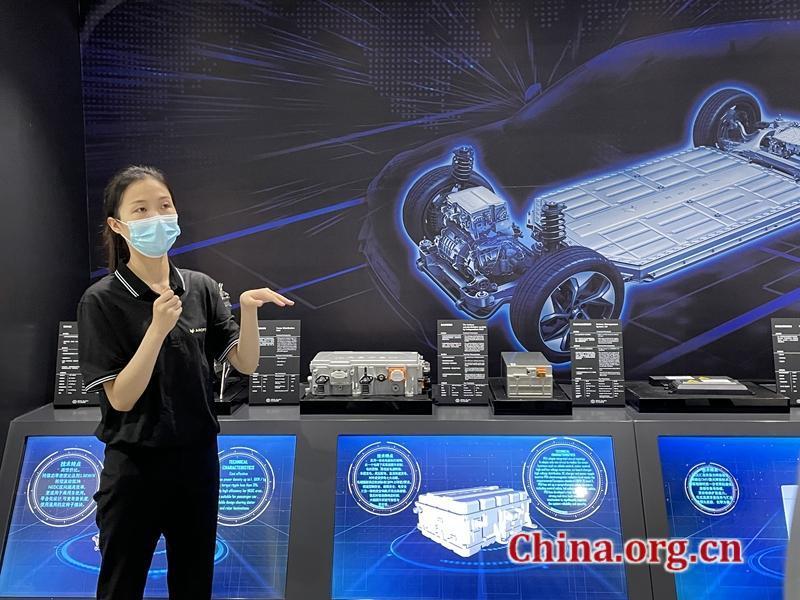Carmaker spearheads carbon reduction efforts with NEV strategies
- By Zhu Bochen
 0 Comment(s)
0 Comment(s) Print
Print E-mail China.org.cn, June 28, 2023
E-mail China.org.cn, June 28, 2023
Chinese carmaker BAIC Group is ramping up innovation on essential electric vehicle components, allocating substantial resources toward research and development (R&D), and implementing eco-friendly manufacturing solutions. These initiatives aim to support the country's efforts to reduce carbon emissions.

A representative explains the NEV battery, electric motor, and electric control systems developed by BAIC Group at the company's subsidiary in Daxing district, Beijing, June 26, 2023. [Photo by Zhu Bochen/China.org.cn]
The Beijing-based company has adopted a four-tier strategy to reach peak carbon emissions by 2025 and achieve decarbonization across its entire product range by 2050. These targets are ambitiously set five and 10 years ahead of the national timeline.
The company's approach highlights developing low-carbon auto product lines, pioneering new technologies for batteries, electric motors, and electric control systems, integrating sustainable manufacturing techniques, and establishing a comprehensive product ecosystem.
The company anticipates a 33% reduction in average carbon emissions from its automobiles by the end of 2025 compared to 2020. It plans to establish two zero-carbon factories by 2025 and equip all its factories with high-efficiency facilities by 2030.
Additionally, during the 14th Five-Year Plan period (2021-2025), the automaker aims to decrease carbon emissions per unit of output value by 21% and reduce carbon emissions per vehicle by 24%.
By 2020, the company's pure electric vehicles had collectively traveled 18.3 billion kilometers, reducing carbon dioxide emissions by 1.94 million metric tons. This impact is comparable to planting 11.37 million trees, emphasizing the company's commitment to sustainability.
BAIC Group represents a microcosm of the burgeoning new energy vehicle (NEV) sector of both Beijing and the country, demonstrating an active response to the national "dual-carbon" goals.
According to the China Machinery Industry Federation, China's production and sales of new-energy vehicles reached 7.05 million and 6.88 million, respectively, in 2022, ranking first globally for an eighth consecutive year, a year-on-year increase of over 90%.
Zooming into Beijing, NEV ownership rose to 507,000 units by the end of 2021, with the penetration rate surging from 8% in 2016 to 22%, higher than the national average.
Public transport in Beijing is also becoming increasingly eco-friendly as more pure electric buses and hybrid vehicles hit the roads. According to official statistics, the Beijing Public Transport Corporation has decreased its energy consumption by 200,000 metric tons of standard coal and reduced carbon dioxide emissions by 400,000 metric tons compared to 2016.






Go to Forum >>0 Comment(s)